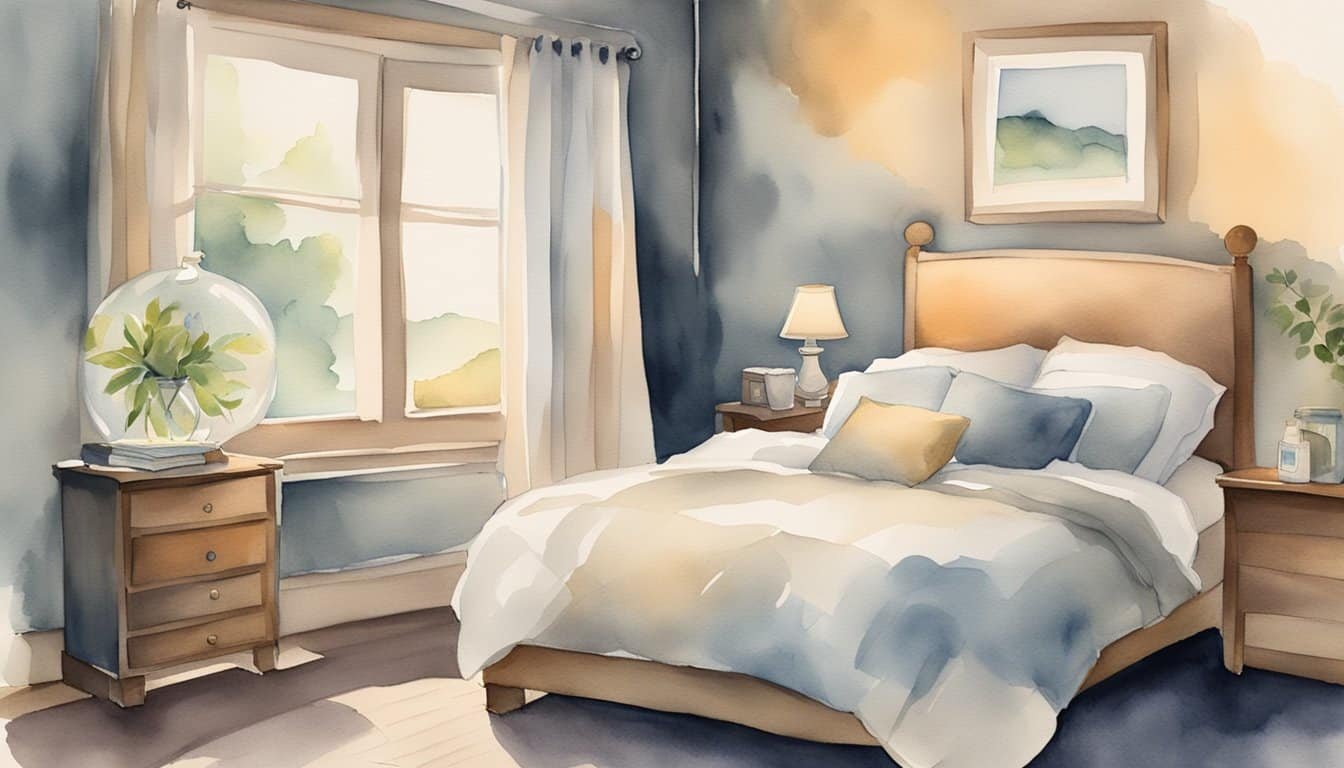Understanding Sleep Challenges
When night after night you find yourself tossing and turning, unable to drift off, it’s crucial to recognize that you might be facing a sleep challenge such as insomnia or another sleep disorder.
Recognizing Insomnia and Sleep Disorders
Insomnia is typically characterized by difficulty falling asleep, staying asleep, or experiencing non-restorative sleep, despite having the chance to get a full night of rest. Chronic insomnia, which persists for at least three nights a week for a month or longer, can have a profound impact on one’s life. Sleep disorders include a range of issues such as sleep apnea, where breathing repeatedly stops and starts during sleep, disrupting the sleep cycle.
Factors Influencing the Likelihood of Insomnia and Sleep Disorders:
- Stress: Day-to-day pressures can lead to racing thoughts at night.
- Caffeine and Alcohol: Consuming these substances can disrupt sleep patterns.
- Aging: Changes in sleep patterns are a part of the aging process.
- Genetic Factors: Sometimes, the predisposition to sleep problems can be inherited.
Factors Affecting Sleep Quality
Several factors, ranging from lifestyle choices to environmental conditions, can affect the quality of sleep. High caffeine intake, especially late in the day, can keep you wide awake due to its stimulating effects. Similarly, alcohol may help you doze off but it fragment the sleep cycle, leading to poorer quality sleep. The blue light emitted by screens can interfere with the circadian rhythm, your body’s natural sleep-wake cycle. Stress and sleep are also closely linked, often creating a vicious cycle of anxiety leading to sleep disturbance and lack of sleep contributing to increased stress.
Common Symptoms of Sleep Problems:
- Difficulty falling asleep
- Waking up frequently during the night
- Feeling tired upon waking
For some, these issues are sporadic, but for others, they may be a nightly battle indicating a more serious condition. In such cases, a sleep study might be recommended to diagnose conditions like sleep apnea, which is known to affect sleep quality significantly.
Please note that some individuals might experience a combination of these factors, contributing to a unique set of sleep challenges. Understanding and addressing the various aspects of your sleep environment, habits, and potential health issues are the first steps toward better rest.
Creating a Sleep-Inducing Environment

Transforming your bedroom into a sanctuary for sleep involves more than just a comfortable mattress. It’s about tailoring the whole environment to cue your body for rest. Let’s delve into the specifics of setting up a sleep-friendly bedroom and how lifestyle choices such as diet and exercise can usher in the Zs.
Optimizing Your Bedroom for Better Sleep
Creating a comfortable environment is crucial for good sleep quality. A few key elements can make all the difference:
- Light: Dim the lights an hour before bedtime. Use blackout curtains to ensure complete darkness, as this signals to your body it’s time to wind down.
- Noise: Keep it down. Use earplugs or a white noise machine if silence isn’t golden in your neighborhood.
- Electronic Devices: Power down for better shut-eye. The blue light from screens can disrupt sleep, so banish TVs and smartphones from the bedroom.
- Temperature: Keep it cool. Most people sleep best in a slightly cool room, around 65 degrees Fahrenheit (18 degrees Celsius).
The Impact of Diet and Exercise on Sleep
Diet and exercise are the dynamic duo for sleep induction:
- Diet: Heavy meals before bed can lead to discomfort, but a light snack could prevent midnight hunger pangs. Foods like cherries and almonds contain melatonin and magnesium, which may promote sleep.
- Exercise: Regular physical activity can tire you out in a good way. Just be sure to finish workout sessions at least a few hours before bedtime to avoid feeling too energized to sleep.
Incorporating relaxation techniques into your evening routine can also help. Whether it’s gentle yoga, deep breathing, or meditation, winding down physically and mentally sets the stage for a restful night without the need for sleeping pills.
Establishing a Sleep-Positive Routine

Creating a sleep-positive routine means incorporating habits that signal to the body it’s time to wind down and embrace rest. A routine can help regulate the body’s internal clock and lead to improved sleep quality.
Building a Consistent Bedtime Routine
A consistent bedtime routine is vital for cueing the body to prepare for sleep. Each night, one should aim to go to bed at the same time. This helps establish a consistent sleep schedule. Engaging in calming activities before bed, such as meditation or journaling, can signal the brain that it’s time to slow down. Incorporating mindfulness practices or gentle yoga sequences can also assist in releasing physical and mental tension.
- Pre-Sleep Habits:
- Turn off all technology at least one hour before sleep.
- Practice 10 minutes of meditation to clear the mind.
- Write down thoughts in a journal to alleviate the burden of rumination.
Daytime Habits That Lead to Better Nighttime Rest
Daytime behaviors have a significant impact on sleep. Sticking to a daytime routine with regular times to wake up, coupled with exposure to natural light in the morning, anchors a consistent sleep-wake cycle. It’s also wise to avoid napping late in the day, as this can interfere with nighttime rest. Minimizing afternoon caffeine consumption ensures it won’t disrupt the ability to fall asleep.
- Daytime Tips for Better Sleep:
- Get at least 30 minutes of sunlight upon waking.
- Avoid caffeine after 2 p.m.
- Stay active during the day but avoid intense exercise near bedtime.
Dealing with Sleep Disruption
Battling the night hours awake can be frustrating, but understanding when to surrender to wakefulness and techniques to calm the mind can be crucial for those who can’t sleep. This section will explore actionable advice to tackle the tossing and turning that disrupt stress-laden nights and guide you back to dreamland.
When to Get Out of Bed
If you find yourself lying in bed for what feels like an eternity, it may be time to get out of bed. Experts suggest that if one cannot fall asleep within approximately 20 minutes, they should leave the bedroom and engage in a quiet, non-stimulating activity. This might include reading or listening to soothing music. One should avoid watching television or scrolling through their phone, as these activities can increase alertness. The key is to make sure that the sleep environment is reserved for sleep and intimacy only, reinforcing the bed as a cue for sleep, not wakefulness.
Calming the Mind for a Restful Sleep
When their head hits the pillow and sleep seems miles away, many people are plagued by stress and anxiety. To usher in a restful night’s slumber, individuals might find solace in relaxation techniques or deep breathing exercises. These practices can reduce overall tension and make the process of falling asleep easier. In some cases, creating a background of white noise or employing the use of supplements such as melatonin might help. However, individuals should avoid the impulse to self-medicate with sleep medication or drink alcohol, as these can lead to disrupted sleep patterns. In persistent cases, seeking advice from a sleep specialist is recommended to address underlying sleep issues. They may suggest adjustments in sleep hygiene or other tailored strategies to improve mental well-being and performance during waking hours.
Interventions and Therapies for Sleep Improvement

When lying in bed for hours unable to sleep becomes a regular occurrence, exploring effective interventions and therapies becomes essential. This guide will highlight professional treatments and natural remedies that can lead to improved slumber.
Professional Treatment Options and When to Seek Help
Professional help should be considered when sleep issues persist despite self-help efforts. Cognitive Behavioral Therapy for Insomnia (CBTi) is a highly recommended non-pharmacological treatment. It focuses on changing sleep habits, behaviors, and thoughts that affect sleep. Accredited by the American Academy of Sleep Medicine, CBTi can address issues like insomnia, narcolepsy, and restless legs syndrome.
When over-the-counter remedies and sleep hygiene adjustments fail, consulting with a sleep specialist can help identify underlying conditions and create a tailored treatment plan. Possible options include:
- Medications: Prescription sleeping pills may be advised for short-term relief, but they’re not typically recommended for long-term use due to potential dependency and side effects.
- Supplements: Like melatonin, which can help regulate the sleep-wake cycle, especially for individuals experiencing jet lag or shift work disruptions.
Home Remedies and Natural Solutions
Home remedies often center around enhancing sleep hygiene, which includes pre-sleep rituals and a comforting bedtime environment. Effective strategies include:
- Progressive Muscle Relaxation and the military method, which are calming activities that promote relaxation by tensing and relaxing muscles.
- Controlled Breathing: Techniques like the 4-7-8 method can calm the mind before bedtime.
- Aromatherapy: Essential oils like lavender have been linked to improved sleep quality.
- Relaxing Activity: Engaging in calming activities, such as reading or a warm bath, as part of a nightly routine helps signal the body that it’s time to wind down.
Creating a proactive approach to sleep improvement with natural solutions can be beneficial, especially when combined with professional advice.

